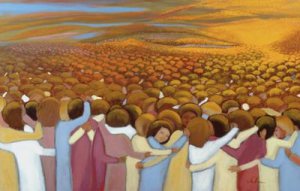Notes on the Notes – August 6, 2023

This week’s music:
“Creator, Companion, Comforter”
“God of Creation
Gentle life-giver
Present at birth, and
all through our days
Author of sunrise
Song in the night sky
Here in this place, we
offer our praise
Jesus, Companion
teacher and healer
friend of the grieving,
suffering, the poor
Stand with your people
whisper among us
promise of mercy
goodness for all
Spirit of Comfort
blow through Creation
stir up new life, breathe
peace through our world
Healer of hearts, and
hope for tomorrow
weave all our sorrows
into new dawn
Here we give thanks for
life in its fullness
blessings received
your gifts to us all
Make us a people
filled with compassion
selflessly giving
serving your world
As we gather together in worship, we open our service with this hymn with words by Craig Mitchell, written in 2010. In the first three verses we have a description of the trinity – God as Creator, Jesus as Companion and Holy Spirit as Comforter. We join together to praise God for the creation; we ask for Jesus to walk with us as we seek to follow his ways; and we ask the Spirit to be with us, comforting and encouraging us. The closing verse expresses our thanks for life and its blessings, and our faith in becoming a people doing God’s work in the world. The tune we will be using is BUNESSAN, a Gaelic tune that was first published (melody only) in Lachlan Macbean’s Songs and Hymns of the Gael (1888) as a setting for Mary Macdonald’s carol “Child in the Manger.” The tune is named after Macdonald’s birthplace on the Isle of Mull, Scotland. BUNESSAN is also well known as the setting for Eleanor Farjeon’s “Morning Has Broken” (1931), published in many hymnals and widely popularized by Cat Stevens, who recorded an arrangement of the tune in 1971.
Hear a beautiful instrumental version of the tune at: https://youtu.be/xkI2ncRfg2Y
“For the Crowd of Thousands” (VU #355)

“For the crowd of thousands sitting on the ground,
Seven is sufficient, seven will go round.
Seven is sufficient, fish and loaves of bread;
Jesus, for our hunger, gives us life instead.
Jesus makes his offer: fish and bread as food.
Make us truly thankful, make our living good.
If we give to Jesus bread to bless and break,
Five and two will feed us seven days a week.
What we give to Jesus, and with others share,
Will at last be gathered: over and to spare!”
This hymn, first published in 1968, was created by Fred Kaan from a text by Dutch poet and pastor, Wilhelmus Barnard. It is based on the reading from Matthew 14:13-21. The tune, ERNSTEIN, was composed by James Frederick Swift in 1892.
“Jesus, United by Your Grace” (VU #591)
“Jesus, united by your grace, and each to each endeared,
With confidence we seek your face, and know our prayer is heard.
Help us to see in each a friend, each other’s cross to bear;
Let all their friendly aid extend, and feel the other’s care.
Up unto you, our living head, let us in all things grow,
Til you have made us free indeed and faithful here below.
Drawn by the lodestone of your love, let all our hearts unite;
Let us toward each other move, and move toward your light.”
The text of this hymn is taken from the fourth part of Charles Wesley’s “A Prayer for Persons joined in Fellowship,” which was published in Hymns and Sacred Poems in 1742. The words give us a blueprint for our growth in faith – uniting in love, caring for each other, and moving towards God. The tune, ARLINGTON, comes from the overture to Thomas A. Arne’s opera Artaxerxes (1762). It was adapted into a hymn tune by the composer.
“Grant Us, God, the Grace of Giving” (VU #540)
“Grant us, God, the grace of giving,
With a spirit large and free,
That ourselves and all our living
We may offer faithfully.”
The text of our offering response comes from the Mennonite hymn book, “Hymnal: a Worship Book,” and reminds us to freely and faithfully share our gifts, whatever they may be. The tune is a familiar one which is also used for the Advent hymn “Come, Thou Long-Expected Jesus” (VU #2).
“Where is Bread?”
“Where is bread?” the great crowd murmured —
Thousands strong, yet all in need.
“Where is bread?” your people wondered,
Faced with such a crowd to feed.
Who, Lord Jesus, could have guessed it?
One small boy brought food to share.
Taking what he gave, you blessed it;
All were fed, with much to spare.
Where is bread? We know their yearning;
Every day, we wish for more.
God, in time, we’re slowly learning:
All we own can make us poor.
Our possessions can possess us,
Leaving hunger deep inside.
Christ our Bread, come now and bless us;
At your feast, we’re satisfied.
 “Where is bread?” the call is rising;
“Where is bread?” the call is rising;
Millions cry who must be fed.
God, your answer seems surprising:
“You, my Church, you give them bread.”
Bread to fill each hungry spirit,
Bread for hungry stomachs, too!
Give us bread and help us share it.
Richly blest, may we serve you.”
Our closing hymn also references Matthew 14:13-21 (a story also found in the gospels of John, Mark and Luke). The words are by Carolyn Winfrey Gillette (2000) and are included in Songs of Grace: New Hymns for God and Neighbor (Upper Room Books, 2009). The first verse retells the gospel story. The second and third verses move us to our lives today. Verse 2 calls out our reliance on having more and the spiritual emptiness that often follows, reminding us that Jesus is the bread of life that satisfies. The closing verse is a call to serve God through our work in the world, bringing hope and faith to all we meet. We will be using the hymn tune NETTLETON, composed by John Wyeth and published in the Repository of Sacred Music, Part II in 1813.
Hear an instrumental version for Cello, Piano and Organ used in worship at Trinity on the Hill Church at: https://youtu.be/GSX6LVn9bjs
Hear a relaxing instrumental version of the tune at: https://youtu.be/wybS4ojOLQQ
“Bread for the Journey” (MV #202)
“Bread for the journey, food for the way.
Cup of God’s blessing, tomorrow, today.”
Our benediction response was written by Bruce Harding in 2000.
Bonus Video (from our YouTube playlist WPUC Music):
Categories: Notes on the Notes


You must be logged in to post a comment.